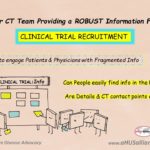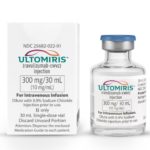Hey Global aHUS alliance.
Hi, but its aHUS alliance Global Action actually
Whatever, let’s settle on GA.
Well we have been called worse, so OK, what do you want?
I don’t think you are doing enough to help aHUS patients find the clinical trials of treatments that may help them.
Well at least by saying “enough” you acknowledge that we are doing somethings. So you are either suggesting that what we do is not effective, or, we should be doing something more.
You got it GA. so you agree you should be doing something about it for the 20,000 plus aHUS patients around the world. Especially for some of the 4000 new patients who will onset with aHUS in the next 12 months.
Hold your horses we haven’t said that. But you do seem well informed on the prevalence and incidence of aHUS in the world.
I read you website, GA.
OK we are beginning to warm to you. If you are a regular reader of this site, and many of the thousands of aHUS patients are not, you will know that, from time to time, we feature articles about aHUS trials involving new treatments coming down the pike.
Every two years we scan the horizon for potential novel treatments for aHUS ( 2022 report). There are also articles which answer patients’ questions about these new drugs. But only when we find out about them and that is often only by chance, or checking the online website ClinicalTrials.gov. No one tells us about them and anyone can check out ClinicalTrials.gov if they needed or wanted to. But we feature them on our website and I could show you the a list of announcements we have made so you can judge for yourself *. If anyone contacts us about trials, and some do, we direct them to the information available and suggest they talk to their doctor about it.
But that should not really be needed if the aHUS patient is already IN a clinical investigation hospital site still recruiting. Should it?
So why are there clinical trials not completing because of lack of recruits.
Hang on a minute this is a common risk for so many disease treatment clinical trials not just aHUS. We have found in some research undertaken that on average about 20% of clinical trials do not meet clinical trial’s recruitment target objectives. It is an even worse situation for trials where the patients are recruited in critical or emergency care . Around 30% of trials of potentially useful treatments are not concluded because targets are not reached. It is probably even harder in emergency situations where a new life saving treatment is being studied.
That’s what I am saying so what do you need to do to stop it happening to aHUS patients.
We are aware that this has happened to aHUS patient trials in the past but as far as we are aware no post mortem of the failure took place, certainly not one including us, to learn for the future. But OK lets’ accept your premise that without some intervention by aHUS patient advocacy organisations, clinical trials will not recruit enough patients. Also that there are things that we can do to encourage patients and /or their families around the world to join in specific trials. To help them in their hour of need.
Yep GA.
Like what ?
You work it out and tell me.
I am sure that general research on studies of past failures to recruit into non aHUS clinical trials have identified factors which can cause failure to recruit, Do you know of any that say that is in any way down to the relevant disease patient organisation? And suggest what those patient organisation can do.
That’s for you to find out not me
OK so I have told you what we have done but let’s look at it from a lay perspective with common sense.. So first of all are we talking about aHUS patients who are newly onseting who have never been on treatment before or those patients who are already getting existing treatments. Let’s just consider the newly onseting who are in the midst of a clinical emergency.
OK you do it that way.
Right now there are people in the world who are so ill they can barely lift their heads from the pillow. They may be surrounded by a family who are very scared and emotional. They have been told they have aHUS, they know nothing about it other than what their doctor has told them. A few weeks ago they were healthy, and , unless they knew about aHUS in their family or friends they were most likely totally unaware of what aHUS is. No different to 99.99 % of the 8 billion people living in the world today.
I concede that may be the case.
Now somewhere in the world today there is a aHUS trial ready to recruit patients to it. Say they are looking for 50 participants. aHUS is a very rare disease so the sample study populations are frequently in tens of people unlike for common disease where there may be thousands.
Should be easy to recruit 50.
You would think so but it might be harder and we can explain. At the outset of a clinical trial there are a host of people experienced and skilled and ready to set up a net to capture suitable patients for the trial where and when they pop up. Patient organisations will know nothing about any this when the plans are being made. When it is happening we are completely out of the loop. Traditionally we have no role in clinical trial design nor conduct. And we are not telepathic.
I did not know that.
We sensed you would say that. Anyway let us look at the general populations in the catchment areas of the hospital where clinical investigation sites are to be place and see how an aHUS patient in a bed somewhere could be found by it.
So the “capture net” is set by the drug manufacturer and the expert clinicians they employ to help them design it.
The net is made up of hospitals in cities, in countries, around the world, who are willing and capable of being trial site investigators. The trial process is going to take years so it will be quite a commitment. They have to be trained in the protocols of the trial etc.
We are not involved in that. We might be if the new technology manufacturer knows about us and asks us for suggestions early on but not all do.
I did not know.
If it is done it is conducted within the confidential barriers set by regulations and rules, so it not surprising you would not know. Anyway if we were asked to give our views we would be likely to suggest countries with an unmet clinical need where there is a recruitment potential. We would know little at that point about the actual scope of the trial recruitment net and its potential to meet its recruitment target.
What do you mean?
Common sense would say that if a trial is being set up and a sample size is calculated so that the results will be statistically significant if the recruitment target is achieved, but not if it doesn’t, then the hospitals need to have a population catchment area in which 50 patients are likely to onset and be willing to enter the trial..
Makes sense.
Keeping it very simple you said earlier that 4000 patients onset with aHUS each year . 50 of them would be 1/80 th of the total incident patients . The world’s population is 8 billion. 1/80th of 8 billion is 100, million. The catchment area population of all the hospitals in the trial would need to be at least 100 million to recruit 50 patients if the recruitment period was one year.
If the recruitment period was two years the catchment are population could be half that number at 50 million. Except ,,,. .
Except???
Except the incidence rate is an estimate and is based on all “types of aHUS’ , includes all adults and children , and men and women. 0.5% is typically used as an incidence rate. You used that hen you said there were 4000 patients each year.
So?
So , what if the clinical trial is going to exclude some aHUS patients. The trial may only be for adults not children. Pregnant women will be excluded. Remember pregnancy is probably the most common cause of female aHUS so reduces potential adult recruits . Or aHUS patients with specific triggering conditions and treatment status are excluded. The incidence of the “restricted aHUS patients” is going to be less.
How much less?
About the length of piece of string. To be honest no one can say with any certainty . If it becomes 0.1% per million, the catchment area population will be need to be 500 million to recruit enough “restricted” patients in one year or 250 million to reach the target in two years.
Let’s say its its 0.25% , it would require a population of 350 million for one year and 175 million for two years to recruit enough patients if everyone says yes to join in. If the trial is set with hospital investigation sites with a total of 85 million it is unlikely they are going to meet the recruitment target.
You said “if everyone says yes to join in” would they not have a choice?
You bet they have a choice. It is their decision and it has to be an informed one.
But the aHUS patient in bed may not in a good state to understand what is involved even though they are in a hospital which is recruiting.
Their family can be a help. If only 50% of “restricted patients” will say “yes” then the population catchment area will need to double to 700 million or 350 million respectively. The trial set up with an 85 million population recruitment is going fail and badly. No matter what intervention patient organisations may now be called upon to do.
But they are very ill so they have no real option.
They are but they can opt for the usual standard care available at that hospital investigation site. That could include well known effective treatments that are already funded for them.
So are you saying that the study recruitment potential is reduced by the consent rate too?
Yes we guess we are.
The ” informed consent given” ratio must be higher than 50:50 though .
Probably but how would we know we are not involved and those in the trial design are not allowed to tell us such things.
There are other factors too like trying to launch a trial during or just after a pandemic like COVID when hospitals are overwhelmed and backlogs are created. Even more focus to COVID clinical trials than the “routine” trials. Of course you can extend the recruiting period for a couple of years. Or increase the number of investigating hospitals
OK I see , so you cannot influence recruitment of patients in places which are not recruiting sites and in the recruiting sites a paid “team” of health care professional would be the ones truly responsible for achieving recruitment targets if the gods of aHUS incidence permit.
We think so.
Whether and how we should be involved is another matter
Explain
Our face to the world is our website and social media. Our audience is wide ranging but our reach depends on things outside our control. if the patient in the bed is in a hospital in India or China, our reach will unlikely get as far as them. And Google or other search engine algorithms may not place us high enough on search results for the tags used.
And so it will be too for the patients in the beds in other hospital investigating sites in other countries. It is also unlikely the investigating clinician will know about us either nor would they be able to advise the patient on how to find us. Nor would they want to if they did know.
But also should we give advice about a medical matter. Is it ethical and legal to do so. We are not trained counsellors. We can report factual information about trials, which is in the public domain. We are certainly not an advertising agency for Pharmaceutical companies.
OK I accept your points but would it be good thing if you could say all this to those involved in clinical trial design.
For that you will need to speak to the Global aHUS Community Advisory Board.
I will call them CAB ……
They will uber-pleased to know that.
Article No. 550
*iF YOU HAVE THE TIME THESE ARE SOME OF THE ARTICLES WE HAVE WRITTEN ABOUT CLINICAL TRIALS

aHUS clinical trials are not that easy
To answer some of the questions in the aHUS Patients Research Agenda clinical trials will be needed. Take the issue of withdrawal from complement inhibitor treatment. Setting up a trial…
CONTINUE READINGaHUS clinical trials are not that easy

The ethics of aHUS treatment trials
When someone is affected by aHUS, the issue of it being a rare disease soon becomes apparent. The injustices felt by those with rare diseases permeate the thinking of those…
CONTINUE READINGThe ethics of aHUS treatment trials

Trial watch 16 -Factor D complement inhibitor.
One of the ways to find out which drugs have a potential for aHUS treatment is to look at trials for PNH treatment. One such trial is listed on Clinical…
CONTINUE READINGTrial watch 16 -Factor D complement inhibitor.

aHUS Trial Watch 15 ( Iptacopan) update
Global Action featured a new trial for an aHUS treatment iptacopan earlier this year ( CLICK ON IMAGE BELOW) aHUS Trial Watch 15 (Iptacopan) Iptacopan is a complement inhibitor that…
CONTINUE READINGaHUS Trial Watch 15 ( Iptacopan) update

aHUS Trial Watch 15 (Iptacopan)
Iptacopan is a complement inhibitor that it is taken orally, twice daily. It works by inhibiting Complement Factor B (CFB ). Without CFB , C5 cannot be activated to create…
CONTINUE READINGaHUS Trial Watch 15 (Iptacopan)

aHUS Trial Watch 14
A trial has been designed by Alexion to examine the efficacy of Ravulizumab to treat those with a Thrombotic Microngiopathy , TMA, caused by a trigger. This somewhat vague scoping…
CONTINUE READINGaHUS Trial Watch 14

aHUS Trials Watch 12a (crovalimab)
Article No. 445 13 July 2021 Hoffmann Roche has announced its pediatric trial of crovalimab for aHUS. It is featured on the ClinicalTrials.Gov website and can be found at this…
CONTINUE READINGaHUS Trials Watch 12a (crovalimab)

aHUS Trial Watch 12 (crovalimab update)
Article No. 432 7 May 2021 In the past week or so, the possible trial of a new technology for treating aHUS, that we reported on in website article No…

Being An aHUS Trialist
Article No. 419 16 February 2021 It is spring time in 2017. You feel very unwell, very poorly. It is thought you have aHUS. You get a chance to have…
CONTINUE READINGBeing An aHUS Trialist

aHUS Trials Watch 11 ( Crovalimab)
Article No. 415 1 February 2021 In a recent article (article413) about research into why specifically monoclonal antibodies (mAb) work when blockading Complement Protein C5 , a novel mAb called…
CONTINUE READINGaHUS Trials Watch 11 ( Crovalimab)

aHUS TRIALS WATCH 10
Article No. 331 8 March 2020 During his talk about potential complement inhibitors, Dr Richard Smith mentioned a ClinicalTrials.gov clinical trial regarding eculizumab for treating COVID-19 or ‘corona virus disease…
CONTINUE READINGaHUS TRIALS WATCH 10

aHUS trials watch 9
Article No. 318 13 February 2020 The alliance has reported on the development of OMS721 made by Omeros before. It is a potential drug therapy for aHUS that has been…
CONTINUE READINGaHUS trials watch 9

aHUS Trials Watch 8
Cemdisiran has been a possible candidate drug for aHUS for some time. Alnylam the pharmaceutical company responsible for its development, withdrew from an earlier trial for it to be used…
CONTINUE READINGaHUS Trials Watch 8

aHUS Trials Watch 7
News announced in recent days that, unlike in the USA , Europe does not intend to extend the patent for Eculizumab when it expires in 2020.The US patent is to…
CONTINUE READINGaHUS Trials Watch 7

aHUS Trials Watch 6
The aHUS alliance has found out that there has been a trial of the drug Coversin for the treatment of aHUS ( there is one too for PNH which was…
CONTINUE READINGaHUS Trials Watch 6

Breaking Down Barriers in aHUS Clinical Trials
Break down in communication flows and fragmented outreach have built barriers for research and clinical trial enrollment regarding advancing new options for those with the rare disease atypical HUS (aHUS, or hemolytic uremic syndrome). The aHUS Alliance looks at current challenges, and potential pathways to explore and engage.

aHUS Trials Watch 6
As aHUS Awareness Day approaches it is timely to be aware of developments in the next version of eculizumab , the version now known as ALXN 1210. There are 7…
CONTINUE READINGaHUS Trials Watch 6

aHUS Trials Watch 5
An update on STOPECU ( NCT02574403) -the French Study of the withdrawal from eculizumab treatment which began in late 2015. ( click here for trial details ) and has planned to…
CONTINUE READINGaHUS Trials Watch 5

aHUS Trials Watch 4
Some news about trials affecting those with aHUS; but at two ends of the clinical research spectrum. The first is about recruitment taking place in number of Eastern European Countries,…
CONTINUE READINGaHUS Trials Watch 4

aHUS Trials Watch 3
In the aHUS Trials Watch 2 blog ( see here) news about a trial of a new complement inhibitor Cemdisiran using different technology was given. There is more information about…
CONTINUE READINGaHUS Trials Watch 3

aHUS Trials Watch 2
Earlier this year the alliance began a watch on trials announced which relate to treatment of aHUS. Click here for the previous news item An additional trial has been announced…
CONTINUE READINGaHUS Trials Watch 2

aHUS Trials Watch
The aHUS trial scene is very active but aHUS patients are often unaware of what is happening. The aHUS alliance will therefore be keeping a watch and periodically report on…
CONTINUE READINGaHUS Trials Watch

Trials relevant for aHUS patients around the world
One of the best ways to keep up to date with clinical trials relating to complement inhibitors and aHUS is to browse the ClinicalTrials.gov website. Entering “aHUS” in the search…
CONTINUE READINGTrials relevant for aHUS patients around the world

Atypical HUS Research: NOV 2022 New Additions
There are important publications about atypical HUS which people might miss given that key search terms may scan but miss the wide variations in the disease’s name and classification. It’s…

